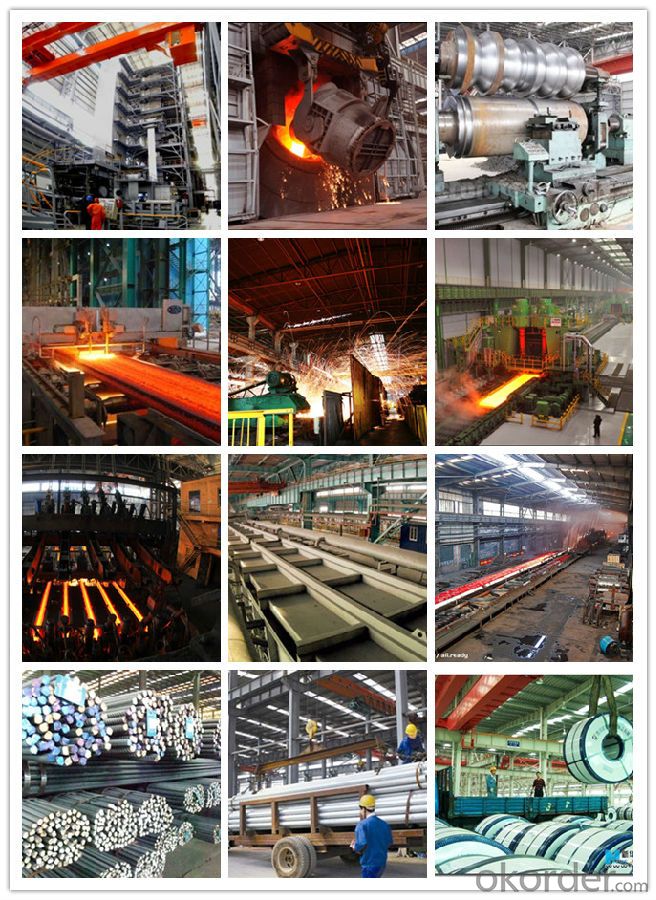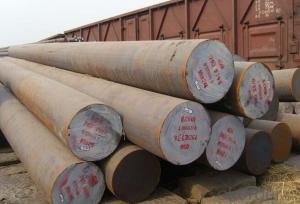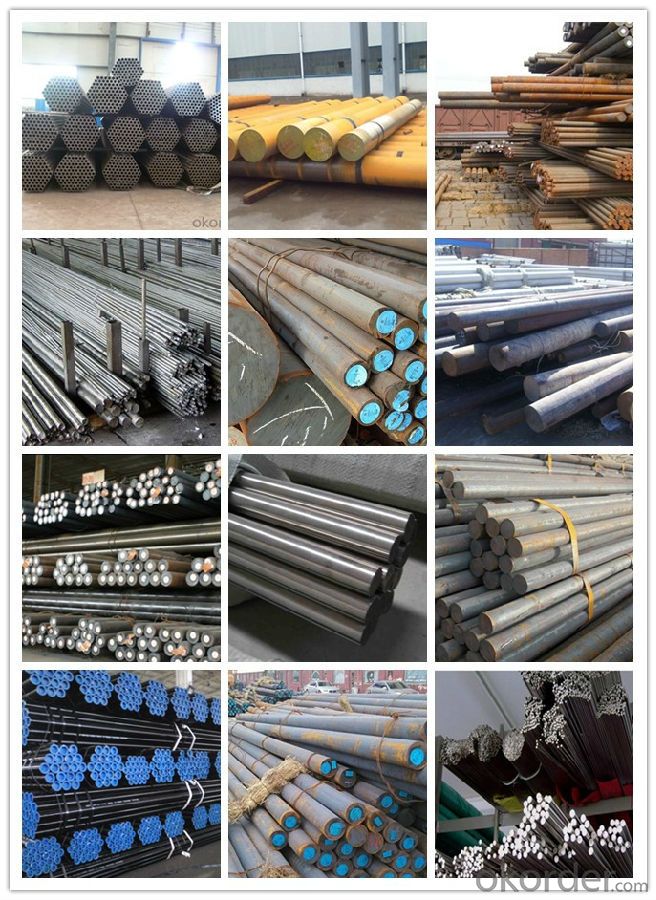Special Steel SAE1010 Carbon Steel Round Bars
- Loading Port:
- China main port
- Payment Terms:
- TT OR LC
- Min Order Qty:
- 30 m.t.
- Supply Capability:
- 10000 m.t./month
OKorder Service Pledge
OKorder Financial Service
You Might Also Like
Item specifice
Specification :
| Size | round | Dia 16mm~350mm |
| Standard | GB/T699-1999 | |
| Surface Condition | Black surface | |
| Delivery Condition | hot rolled | |
| Payment Terms | T/T;L/C | |
| Trade Terms | FOB;CIF | |
Product List :
| GB | ASTM | JIS | EN | DIN |
| 10# | 1010 | S10C | C10C | 1.0214 |
| 15 # | 1015 | S15C | C15C | 1.0234 |
| 20 # | 1020 | S20C | C22 | 1.0411 |
| 25 # | 1025 | S25C | C25 | 1.0406 |
| 30 # | 1030 | S30C | C30 | 1.0528 |
| 35 # | 1035 | S35C | C35 | 1.0501 |
| 40 # | 1040 | S40C | C40 | 1.0511 |
| 45 # | 1045 | S45C | C45 | 1.0503 |
| 50 # | 1050 | S50C | C50 | 1.054 |
| 55 # | 1055 | S55C | C55 | 1.0535 |
| 60 # | 1060 | S58C | C60 | 1.0601 |
| 65 # | 1065 | SWRH67B | C66D | 1.0612 |
| 70 # | 1070 | SWRH72A | C70D | 1.0615 |
| 75 # | 1075 | SWRH77A | C76D | 1.0614 |
| 80 # | 1080 | SWRH82A | C80D | 1.0622 |
| 85 # | 1084 | SWRH82A | C86D | 1.0616 |
Product show
Workshop show

Shipping
1. FedEx/DHL/UPS/TNT for samples, Door-to-Door;
2. By Air or by Sea for batch goods, for FCL; Airport/ Port receiving;
3. Customers specifying freight forwarders or negotiable shipping methods!
Delivery Time: 3-7 days for samples; 5-25 days for batch goods.
Payment Terms
1.Payment: T/T, L/C, Western Union, MoneyGram,PayPal; 30% deposits; 70% balance before delivery.
2.MOQ: 1pcs
3.Warranty : 3 years
4.Package Informations: 1) EXPORT, In 20 feet (GW 25 ton) or 40 feet Container (GW 25 ton)
2)as customer's requirement
Why choose us?
(1) The leading exporter in China special steel industry.
(2) Large stocks for various sizes, fast delivery date.
(3) Good business relationship with China famous factories.
(4) More than 7 years steel exporting experience.
(5) Good after-sales service guarantee.
- Q:What are the different methods of surface protection for special steel?
- There are several different methods of surface protection for special steel, each offering unique benefits and suitable for specific applications. Some of the most common methods include: 1. Galvanization: This process involves coating the steel with a layer of zinc, which provides excellent corrosion resistance. Galvanization can be done through hot-dip galvanizing or electroplating, depending on the specific requirements. 2. Paint coating: Applying a paint coating to the surface of special steel helps to protect it from corrosion and environmental elements. The paint acts as a barrier between the steel and external factors, preventing rust and damage. 3. Powder coating: Powder coating involves applying a dry powder to the steel surface and then heating it to form a protective layer. This method provides excellent resistance to corrosion, chemicals, and abrasion, making it ideal for applications where the steel is exposed to harsh conditions. 4. Electroplating: Electroplating involves depositing a layer of metal onto the steel surface through an electrochemical process. This method enhances the steel's corrosion resistance and can provide additional benefits such as increased hardness or improved aesthetics. 5. Thermal spraying: This method involves melting or heating a material, such as zinc or aluminum, and spraying it onto the steel surface to form a protective coating. Thermal spraying provides excellent corrosion protection and can be used to repair damaged surfaces. 6. Ceramic coating: Ceramic coatings are highly resistant to corrosion, abrasion, and high temperatures. They are often used in applications where the steel is exposed to extreme conditions, such as in the aerospace or automotive industries. 7. Passivation: Passivation is a chemical process that removes free iron and other contaminants from the surface of stainless steel. This helps to improve the steel's corrosion resistance by forming a passive oxide layer. It is important to select the appropriate surface protection method based on the specific requirements of the steel and the application it will be used in. Factors such as the level of corrosion resistance needed, the environmental conditions, and the desired lifespan of the steel should all be considered when choosing a surface protection method.
- Q:What are the properties of corrosion-resistant tool steel?
- Corrosion-resistant tool steel possesses properties such as high hardness, excellent wear resistance, good toughness, and resistance to corrosion and oxidation. It is designed to withstand exposure to harsh environments, chemicals, and moisture, making it ideal for applications where resistance to corrosion is crucial, such as in marine environments or chemical processing industries.
- Q:What are the recycling options for special steel?
- Special steel can be recycled in various ways. One possibility is to bring it to a local scrap yard or metal recycling facility, where they have the necessary equipment to process and recycle it. Typically, they will pay you for the steel based on its weight and current market value. Another option is to get in touch with a specialized recycling company that specifically deals with special steel. These companies possess the expertise to handle and recycle this type of steel, ensuring proper processing and reuse. Furthermore, certain steel manufacturers and distributors have their own recycling programs in place. They may offer take-back programs, collecting and recycling special steel from their customers. This option can be convenient since it eliminates the need to search for a separate recycling facility. It's important to keep in mind that special steel may require special handling and processing due to its unique properties. Therefore, it is advisable to consult with a professional or contact the recycling facility or company in advance, ensuring they can properly handle and recycle the specific type of special steel you possess.
- Q:What are the casting methods for special steel?
- There are several casting methods used for special steel, including investment casting, sand casting, and centrifugal casting. Investment casting, also known as lost-wax casting, involves creating a wax model of the desired part, coating it with a ceramic shell, and then melting the wax away to leave a cavity. Molten steel is then poured into the cavity, creating the final product. Sand casting involves creating a mold using a mixture of sand and a binder, and then pouring molten steel into the mold. Centrifugal casting uses centrifugal force to distribute molten steel into a mold, resulting in a denser and more uniform casting.
- Q:Can special steel be used in the manufacturing of consumer goods?
- Yes, special steel can be used in the manufacturing of consumer goods. Special steel, with its superior strength, durability, and corrosion resistance properties, can be utilized in various consumer products such as kitchen appliances, cutlery, watches, automotive parts, and electronics. Its use enhances the performance and longevity of these goods, making them more reliable and efficient for consumers.
- Q:How is special steel used in the production of surgical instruments?
- Special steel is used in the production of surgical instruments due to its unique properties such as corrosion resistance, high strength, and durability. This type of steel is specifically designed to withstand the harsh conditions of surgical procedures, ensuring the instruments remain sharp, sterile, and reliable. The use of special steel in surgical instruments guarantees precision and quality, ultimately enhancing the safety and effectiveness of medical procedures.
- Q:How is special steel produced?
- Special steel is produced through a combination of refining iron ore, adding alloying elements, and employing advanced manufacturing techniques such as hot rolling, forging, or heat treatment to achieve the desired properties and quality required for specific applications.
- Q:How does special steel contribute to the agriculture industry?
- The agriculture industry heavily relies on special steel to ensure durable and high-performance materials for agricultural machinery and equipment. These steels are specifically designed to withstand the harsh conditions and heavy workloads found in farming operations, resulting in increased efficiency and productivity. Special steel plays a crucial role in agriculture, particularly in the manufacturing of tillage equipment like plows, cultivators, and harrows. These implements require robust materials that can withstand the abrasion and impact of soil and rocks. Special steel provides the necessary strength and hardness to effectively break up the soil, improve soil quality, and prepare the land for planting. Moreover, special steel is extensively used in the production of machinery for planting, harvesting, and processing agricultural products. Combine harvesters, for example, heavily rely on special steel components for their cutting systems, threshing mechanisms, and grain handling systems. By utilizing special steel, these machines can efficiently handle the demanding tasks of crop collection, separation, and storage. Furthermore, special steel enhances the longevity and reliability of agricultural equipment. Agricultural machinery operates in challenging environments exposed to corrosive elements, moisture, and extreme temperatures. Special steel, often coated with protective layers, offers resistance against corrosion, rust, and wear, ultimately extending the lifespan of agricultural equipment. Additionally, the use of special steel in machinery manufacturing leads to improved precision and accuracy in agricultural operations. Precision agriculture, which involves using advanced technologies to optimize productivity, reduce waste, and conserve resources, increasingly relies on special steel components. These components enable more precise movements, better control, and increased accuracy in machinery, resulting in improved efficiency and waste reduction. In conclusion, special steel is essential to the agriculture industry as it provides the necessary strength, durability, and precision required for various agricultural machinery and equipment. By utilizing these high-quality materials, farmers can enhance productivity, reduce downtime, and achieve sustainable farming practices.
- Q:How does special steel contribute to the railway industry?
- Special steel contributes to the railway industry by providing high-strength, durable and corrosion-resistant materials for various components such as rails, wheels, and axles. This ensures the safety and reliability of train operations, as special steel can withstand heavy loads, extreme temperatures, and intense wear and tear. It also enables the construction of lighter and more efficient trains, improving fuel efficiency and reducing maintenance costs. Additionally, special steel is essential for the development of advanced technologies like high-speed trains and magnetic levitation systems, pushing the boundaries of railway transportation.
- Q:How does special steel contribute to national security?
- Special steel contributes to national security in several ways. Firstly, it is used in the manufacturing of military equipment and weapons. Special steel possesses high strength, toughness, and resistance to corrosion, making it ideal for producing tanks, armored vehicles, submarines, and aircraft carriers. The use of special steel in military applications ensures the durability and reliability of these crucial defense systems, ultimately enhancing national security. Secondly, special steel is used in the construction of critical infrastructure. It is employed in the fabrication of bridges, tunnels, and buildings that are key to the functioning and security of a nation. Special steel's superior strength and resistance to extreme conditions make it an essential material for structures that need to withstand natural disasters, terrorist attacks, or other security threats. By utilizing special steel in infrastructure projects, a nation can bolster its security and protect its citizens. Furthermore, special steel plays a vital role in the energy sector, particularly in nuclear power plants. Special steel alloys are used in the construction of reactor vessels and other components that are subjected to high temperatures and pressures. The use of special steel ensures the integrity and safety of these critical facilities, preventing potential nuclear accidents that could pose a significant threat to national security. Lastly, special steel contributes to national security by supporting the defense industry and fostering technological advancements. The research and development of special steel alloys often lead to breakthroughs in material engineering, which can have broader applications beyond defense. These advancements can drive innovation in other sectors, such as aerospace, automotive, and energy, thereby enhancing a nation's overall technological capabilities and economic competitiveness. In conclusion, special steel's contribution to national security is multifaceted. Its use in military equipment, critical infrastructure, nuclear power plants, and technological advancements all play a crucial role in safeguarding a nation's interests, protecting its citizens, and maintaining its strategic advantage in an increasingly volatile world.
1. Manufacturer Overview |
|
|---|---|
| Location | |
| Year Established | |
| Annual Output Value | |
| Main Markets | |
| Company Certifications | |
2. Manufacturer Certificates |
|
|---|---|
| a) Certification Name | |
| Range | |
| Reference | |
| Validity Period | |
3. Manufacturer Capability |
|
|---|---|
| a)Trade Capacity | |
| Nearest Port | |
| Export Percentage | |
| No.of Employees in Trade Department | |
| Language Spoken: | |
| b)Factory Information | |
| Factory Size: | |
| No. of Production Lines | |
| Contract Manufacturing | |
| Product Price Range | |
Send your message to us
Special Steel SAE1010 Carbon Steel Round Bars
- Loading Port:
- China main port
- Payment Terms:
- TT OR LC
- Min Order Qty:
- 30 m.t.
- Supply Capability:
- 10000 m.t./month
OKorder Service Pledge
OKorder Financial Service
Similar products
New products
Hot products
Related keywords































